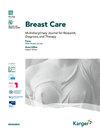Recommendation and Acceptance of Counselling for Familial Cancer Risk in Newly Diagnosed Breast Cancer Cases
IF 2
4区 医学
Q2 OBSTETRICS & GYNECOLOGY
引用次数: 1
Abstract
Background: In clinical routine, not every patient who is offered genetic counselling and diagnostics in order to investigate a familial cancer risk predisposition opts for it. Little is known about acceptance of counselling and testing in newly diagnosed breast cancer cases in Germany. Methods: All primary breast cancer cases and patients with DCIS (ductal carcinoma in situ) treated at the University Hospital of Dresden between 2016 and 2019 were included. The number of tumor board recommendations for genetic counselling on the basis of the GC-HBOC risk criteria was recorded. Acceptance was analyzed by number of cases with counselling in the GC-HBOC-Center Dresden. Results: Of 996 primary breast cancer and DCIS cases, 262 (26.3%) were eligible for genetic counselling. Recommendation for genetic counselling was accepted by 64.1% (168/262). Of these 90.5% (152/168) opted for molecular genetic analysis. The acceptance rate for counselling increased between 2016 and 2019 from 58.3 to 72.6%. Altogether, 20.4% (31/152) patients were found to carry a pathogenic variant in the breast cancer genes BRCA1 or BRCA2. Conclusion: Acceptance of recommendation is increasing as clinical consequences augment. Optimization in providing information about hereditary cancer risk and in accessibility of counselling and testing is required to further improve acceptance of recommendation.新诊断癌症患者家族性癌症风险咨询的推荐与接受
背景:在临床常规中,并不是每个患者提供遗传咨询和诊断,以调查家族性癌症风险倾向选择它。在德国,人们对新诊断的乳腺癌患者接受咨询和检测的情况知之甚少。方法:纳入2016年至2019年在德累斯顿大学医院治疗的所有原发性乳腺癌病例和DCIS(导管原位癌)患者。记录肿瘤委员会根据GC-HBOC风险标准提出的遗传咨询建议的数量。通过在德累斯顿gc - hboc中心接受咨询的病例数来分析接受情况。结果:996例原发性乳腺癌和DCIS患者中,262例(26.3%)符合遗传咨询要求。接受遗传咨询建议者占64.1%(168/262)。其中90.5%(152/168)选择分子遗传分析。从2016年到2019年,心理咨询的接受率从58.3%上升到72.6%。总共有20.4%(31/152)的患者被发现携带乳腺癌基因BRCA1或BRCA2的致病变异。结论:随着临床结果的增加,推荐的接受度也在增加。为了进一步提高建议的接受度,需要优化提供有关遗传性癌症风险的信息以及提供咨询和检测的可及性。
本文章由计算机程序翻译,如有差异,请以英文原文为准。
求助全文
约1分钟内获得全文
求助全文
来源期刊

Breast Care
医学-妇产科学
CiteScore
4.40
自引率
4.80%
发文量
45
审稿时长
6-12 weeks
期刊介绍:
''Breast Care'' is a peer-reviewed scientific journal that covers all aspects of breast biology. Due to its interdisciplinary perspective, it encompasses articles on basic research, prevention, diagnosis, and treatment of malignant diseases of the breast. In addition to presenting current developments in clinical research, the scope of clinical practice is broadened by including articles on relevant legal, financial and economic issues.
 求助内容:
求助内容: 应助结果提醒方式:
应助结果提醒方式:


